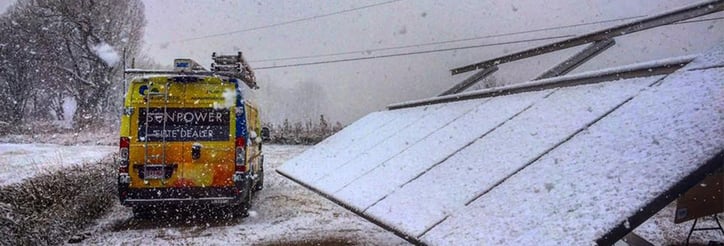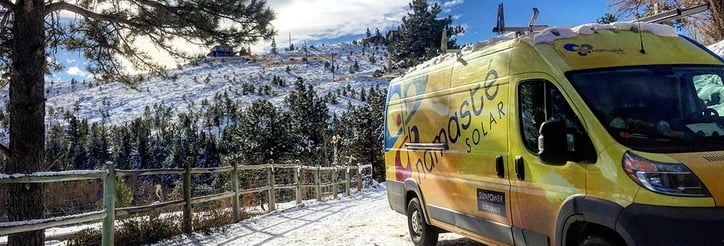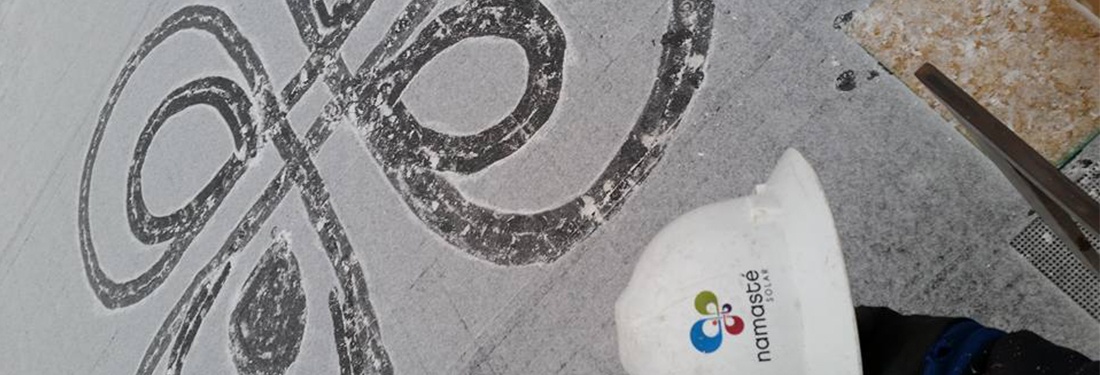Publish Date: January 19th, 2017
Winter can be one of the toughest seasons for solar power generation, but living somewhere that is snowy and cloudy doesn't mean solar isn't right for you. Colder temperatures can actually allow your photovoltaic (PV) panels to work more efficiently. But many other factors, including day length and the sun's position in the sky, can affect production.
These factors are what make summer months, when the sun is high in the sky for more hours, better for solar power generation - there's just more sun beaming more directly down onto your panels. If you have a newer system that includes both production and net meters, you can bank summer kWh, rolling them over to lower-production months to help mitigate higher electric bills.

If you're seeing lower kWh production and/or higher electric bills this time of year, it is unlikely your system is broken or under-performing. The combination of lower production potential and more snow and cloudy days makes for overall decreased generation. That can mean you're drawing more from the grid (and paying for it) if you haven't banked enough kWh. Yearly production can fluctuate ±10% off predicted kWh, but monthly production can fluctuate as much as ±30%. A lot of this production loss in winter can be due to snow covering your PV panels.
Just like your thermostat, your inverter has lower and upper limits to when it turns on. If your array is covered in snow (even in part), production may not be within the inverter's DC operating range, meaning the inverter won't turn on and you won't be generating electricity. However, Namaste Solar works to make sure these production losses aren't a huge influence on your production; "We put what in the market now is the most efficient system up on your roof to hopefully make up for these losses and this downtime," said Kyle Travis, Namaste Solar Service Manager.

You don't have to worry about the weight of snow on your panels, though many people still choose to clear off their panels to reduce production losses due to frost or snow coverage. This is especially true for people living off the grid. Deciding whether to clear off panels is up to you, but if you do, use an extendable window cleaner (so you don't scratch the modules) and be safe, especially if you're up on a ladder or standing close to where the snow will come down. A plus is that you don't have to be "super detail-oriented" in this effort, according to Nico Harper, Namaste Solar's Service Support Specialist. "Modules get a lot hotter than the ambient temperature. If you just do a once-over and there's still lots of little chunks, that stuff usually melts off in a few hours."
If you're facing zero-production days in the winter due to snow coverage, it's important to remember those are the best days to miss - they're already the lowest production times. "An average production day in winter is maybe 25 kWh, but it can be 60-70 kWh in the summer. So losing three winter days can be made up for in one or two summer days," said Travis.

But what do installers do on those snowy winter days? "We're going to do as much work as we can safely," according to Travis, scheduling installations and maintenance around the forecast and the work that needs to be performed. When it's not safe to be on roofs, Namaste Solar crews instead focus on the ground-level work and sometimes clear off sections of roofs, allowing the sun to melt snow on work zones.
There will also be delays in shipments and service in the winter due to unsafe conditions, "so basically the message is just patience, because everything slows down. But we try to do things [on snow days] that are going to improve efficiency once the snow clears," said Harper.
Don't worry though, said Travis; "It's Colorado. The sun's going to come out, and it's going to melt the snow." All systems (from our crews to your panels) will be up and running in no time.
Get expert, honest answers to the top questions you need to ask when considering solar for your home. Download the Essential Home Solar Buying Guide.
Do you want to see how much you could save by going solar?
Contact our team of solar experts to request a free quote.


